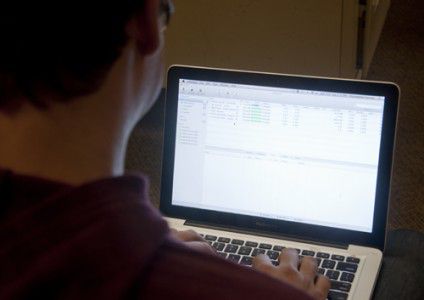Joel Tenenbaum, a Boston University alumnus and lecturer in the School of Management currently fighting a $675,000 fine for alleged online piracy, was not the first or the last to pirate copyrighted material using the BU server.

A number of BU students said they illegally download music despite the university’s warnings.
A U.S. District Court upheld the constitutionality of a $675,000 fine against Tenenbaum, who was sued for illegally downloading and distributing 31 songs from a file-sharing website. The court denied his claim for a mistrial on Aug. 24.
Enzo Martinelli, a College Arts and Sciences senior, said he has been caught by BU on three separate occasions for downloading movies for free.
“These artists make a majority of their money from concerts and stuff anyways, so this [piracy] isn’t affecting them as much,” Martinelli said.
Tenenbaum did not deny that he downloaded the songs, but instead persisted in the case for so long because he did not believe the $675,000 fine was an appropriate punishment.
The fine was excessive, said Justin Gutman, a senior in the CAS.
“Maybe I could see if he was pirating thousands of songs, but only 31 does not deserve that high of a fine,” he said.
On the other hand, a CAS junior Gunita Singh said it would be justified if the recording industry is trying to make an example of him.
“I personally don’t download [illegally]. I used to, but then I became friends with a lot of artists and underground musicians,” she said. “They put a lot of work into what they do and they should be compensated for it.”
College of Engineering sophomore Garrett Moore said he thinks twice before downloading and tries not to download at all.
“If I like an artist, I would like to support their music,” he said. “There’s more of a chance of being caught on the BU server.”
School of Law professor Wendy Gordon said in a case like this, the judge can make him pay much more than what the actual damage was because of the statutory damage provision.
Shortly after the decision, Tenenbaum tweeted, “You may have heard of the latest developments. No, I don’t have $675k. We will continue to fight this.”
After the U.S. Supreme Court refused to hear his appeal, the case was bumped down to the U.S. District Court of Massachusetts for a final ruling by Judge Rya Zobel. Zobel ruled on Aug. 24 that the fine was not excessive at $22,500 per track, which is 15 percent of the statutory maximum.
“If you double-park your car, you expect to get a ticket, but you don’t expect to get a $1 million fine,” Tenenbaum said in a previous interview with The Daily Free Press.
Tenenbaum said in his blog after the ruling he “disagrees rigorously with Judge Zobel’s decision.”
He went on to cite a list of myths about the case and reasons he should not be charged such a high fine, one of them being that the precedent they are basing this on is from 1976, a time before online file sharing was possible.
“You may as well try me for murder for a parking ticket, sentence me to 10 years in prison and then uphold the penalty because the penalty could have been life,” Tenenbaum said in his blog.
In his blog on joelfightsback.com, Tenenbaum said he plans to continue fighting this ruling.
“I, having just defended my thesis, continue my life as before, teaching students in the Boston area about physics and statistics and other things like that,” he said.
Amy Gorel contributed to the reporting of this story.
This is an account occasionally used by the Daily Free Press editors to post archived posts from previous iterations of the site or otherwise for special circumstance publications. See authorship info on the byline at the top of the page.



